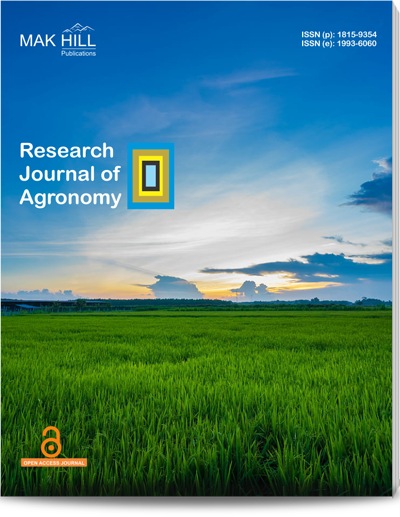
Research Journal of Agronomy
ISSN: Online 1993-6060ISSN: Print 1815-9354
117
Views
1
Downloads
Influence of Composted Tithonia-biomass and N-Mineral Fertilizer on Soil Physico-Chemical Properties and Performance of Tomato (Lycopersicon lycopersicum)
P.A. Babajide , O.S. Olabode , W.B. Akanbi , O.O. Olatunji and E.A. Ewetola
Page: 101-106 | Received 21 Sep 2022, Published online: 21 Sep 2022
Full Text Reference XML File PDF File
Abstract
An adoption of a low input technology, which carefully incorporates wild-plant residues such as Mexican sunflower (Tithonia diversifolia (Hemsl.) A. Gray), into soils for vegetable crop production (either as a substitute or supplement to the highly-priced chemical/synthetic fertilizers), may be beneficial to sustainable tropical crop production, most especially in the aspects of improved soil fertility, productivity, pH, regulated soil temperature, moisture and bulk density. Field studies were conducted to assess the response of tomato to composted tithonia-biomass with or without N-mineral fertilizer and the possible effects on soil physical and chemical properties, in southwestern Nigeria. The treatments introduced were 0, 3.0 and 6.0 tons ha 1 of composted tithonia-biomass and 0, 30 and 60 kg N ha 1 of urea (46% N). Soil physical and chemical properties were significantly and positively enhanced with increasing rate of compost application. Growth and yield parameters such as plant height, leaf area, number of branches, tap-root length, stem circumference, fruit diameter and fruit yield significantly increased with increasing levels of sole and combined application of compost and N-mineral fertilizer. Combined application of 30 kg N ha 1 and 3.0 tons ha 1 was found adequate for optimum growth and fruit yield and even for desirable improvement in the soil physical and chemical properties.
How to cite this article:
P.A. Babajide , O.S. Olabode , W.B. Akanbi , O.O. Olatunji and E.A. Ewetola . Influence of Composted Tithonia-biomass and N-Mineral Fertilizer on Soil Physico-Chemical Properties and Performance of Tomato (Lycopersicon lycopersicum).
DOI: https://doi.org/10.36478/rjagr.2008.101.106
URL: https://www.makhillpublications.co/view-article/1815-9354/rjagr.2008.101.106